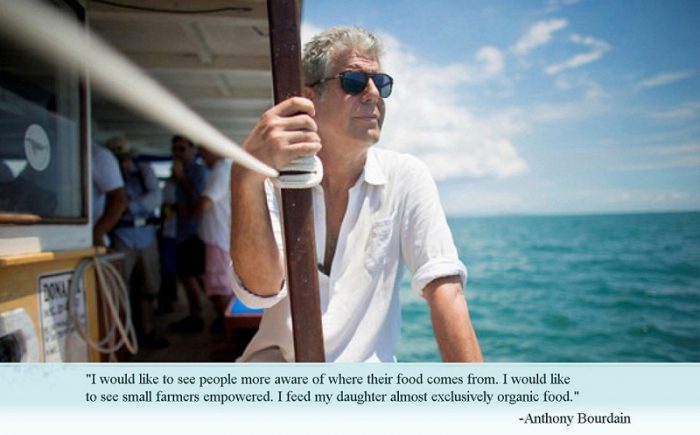Anthony Bourdain, that silver-foxed “Bad Boy of Foodies” was no doubt a creative genius.
Just watching him eat a street-side taco or a rice bowl that sizzled with “parts unknown” from a fish or “who knows what” could make me salivate, both emotionally and physically.
But it wasn’t just the boyish grin and humble manner when he tasted something new that made me hungry. Rather, it was his eager and candid appetite for wanting to devour “not just the delicacies” of other countries, but the delicacy and culture of the people who made the food themselves.
Whether he enjoyed a drink on a beach you now wish to discover, made by a local villager, or a lunch with President Obama as he spoke as casually about politics as he did about the way a sauce is prepared—chances are, you wanted to experience more through the lens of this completely interesting and unique culinary artist and storyteller.
But sadly, now we do not have him. Due to an apparent suicide, we have lost another brilliant and complex person who shared a lot of his joy, and not enough of the pain that he must have been experiencing, even to loved ones who knew him deeply.
And for this, I am in a deep state of grief.
While we knew him so well from what he shared about “Parts Unknown” around the world, there are obviously parts unknown about how he was feeling—parts that we all wish someone had known more about so we might still have him here, cooking and eating up a storm wherever he landed.
In our society, we are largely encouraged to speak up about the things that make us happy, inspired, successful, and even ambitious about changing. But just as importantly, the down times and blue periods are often what shapes the most creative geniuses, and too often we do not discover how they suffered until it is too late.
If you believe that someone who completes suicide is a selfish person, this story is not for you.
If you believe that suicide is simply an attempt for some people to garner drama and attention, this story is not for you.
If you believe that someone who takes their own life may have “felt” they had any other possible choice at their disposal, this story is not for you.
If you believe that victims and so-called “committers” of suicide do so because they might have been bored or just “a bit” depressed or blue, this story is not for you.
If you marginalize people with mental illness as a population of indigent and hopeless segment of society who cannot be helped, this story is not for you.
If you believe that suicidal people simply “choose” to be sad, depressed, tragic, and overly dramatic, this story is not for you.
However, if you happen to know someone who has taken their own life right before your very weeping eyes, this story may be for you.
If you love someone who has repeatedly tried to take their own life—as this person continues to hope they will be successful in their attempt one day, this story may be for you.
And as each morning begins, while the only sun that we know of sets its abundantly bright light—as you pray that suicide will not take another loved one from your life—this story may be for you.
In the young beginning of four Februarys ago, on an especially cold morning, the biting chill of suicide froze our family in its tracks for the very first time.
No one saw it coming.
And frankly, no one ever really does.
That’s what the act of suicide does.
In one sense, it freezes your ability to make sense of anything at all anymore—or want to.
And yet, at the same time, one may become an “Obsessed Warrior” seemingly overnight who seeks to understand anything and everything that may have played a role in a suicide—and what did not.
In my case, the person who’s tried to take her own life on several occasions looks like they seem to have everything, at least in my eyes. But as we all know, looks can be more than deceiving.
Surely, someone with youth on her side would never think of taking her own life. And with so many possibilities for the future, this seemed like an impossible scenario.
But for the people left behind by suicide, the despair never leaves. Instead, a heavy cloud envelopes your every moment as you ask:
“How could I have missed the reality that they must have been so depressed?”
“What could I have done differently, said differently, or listened to differently so I would have suspected?”
“How could they attempt suicide if they joked a lot and seemed fine the last time that we spoke?”
“Just why did my loved one not wish for more days here with us?
“Were things really that terrible? Was life and its future really plagued with so much doubt and shame that they wanted to end it forever?”
Apparently so, and this is the education we are being forced to learn about deep and even sporadic bouts of depression as more people tragically take their own lives, and when we least expected them to.
We are one of the lucky families, if one is to believe in luck at all in the face of death. The female who has now tried to take her life on more than six occasions that we know of in the past four years is still, thankfully, with us.
And after each attempt, sadly there is another person who believes it is a selfish act, rather than an illness fraught with utter despair and frightening consequences.
In her mind, the suicidal loved one truly believes there is no other way out of her despair other than to leave this world. And again, the tragedy is there are many times when she seems effortlessly happy, free in her sense of peace, and excited about her existence and place in the world.
But like a storm that no one forsees coming, the urge to hurt herself arises in an instant, quickly turning a clear-skied day into a dangerous and frightening flurry of despair, with no clear views in plain or hidden sight by those of us around her.
By all reports, suicide is now up by as much as 30 percent in some states in just the last 10 years. People are hurting, people are depressed, and sadly many just can’t see any light at all at the end of their tunnels of despair and grief.
Mental illness is still considered a stigma and not given the serious attention it warrants. There seems to be acceptance now, at least in social media and even politically speaking—when it comes to being addicted to drugs, food, sex, wine, power, and even to addictions themselves.
While some people openly talk about their struggles with weight loss and alcohol as a disease, being depressed or suicidal has largely only been attended to publicly by songs, films, and by the tragic among us.
For the person I know, I can understand how she might feel the future is hopeless as she is empathetic with the suffering she feels she herself can do nothing about. School shootings are not something I had to worry about as a teen, and I cannot fathom how our children can deal with all of the hatred and darkness that pollutes their reality on a daily basis.
But this does not mean I will give up on this person, as I am one of the fortunate people who is somehow able to see light where there is none.
She is still alive, and that is something.
As long as there is another hour or even minute in which she has the possibility of knowing joy, that is something.
And if she only has a “few more somethings” left to appreciate, that too is something that I want to experience with her, as I sit by her side and just listen.
The other day, it was warm in our neighborhood. It was the kind of warm that makes you wiggle and wish that a sprinkler from childhood might magically appear and wash you down, cooling you off just right while you grin sideways.
A little sweaty and glowing from the May afternoon, we just sat side by side drinking ice water from coffee cups that had flowers and music notes painted all around them.
Just then, a light breeze flew from the south that made our skin tingle with pleasure. Right when I was about to say something, I noticed that she was smiling. This, I understood was all that I needed in order to feel relief that she was okay, at that very moment.
Tomorrow, I hope will continue for her as she continues to get professional help, and as our family wraps as much unconditional love around her as we are able to give.
To my readers, colleagues, and friends, if you know anyone at all who has ever said anything about feeling hopeless, do not be afraid to ask them how they are doing on a daily basis.
We all have to learn how to be more comfortable about being uncomfortable. And putting yourself in someone else’s shoes means that you have to ask questions about things you don’t know.
Each day for me is a struggle as someone who loves another who is suicidal. But, how much harder and inconceivable it must be, I ask, to be in the spirit of the one who suffers from feeling that their spirit is no longer for this world?
No one wakes up in the morning and hopes to learn someone they deeply love has completed suicide or has attempted to do so.
No one makes a “To Do” list expecting to visit a loved one at a hospital as they drive there in a fog, wondering how they could have missed the signs.
And that is the problem with suicide. Evidently, most of the time we see no obvious warning signs.
No one can explain how a person truly felt or just what they were feeling before they took their own precious life.
As I grieve for Anthony Bourdain, Kate Spade, and countless other “just as important,” nameless people who die at their own hands, I try to imagine the utter despair one must truly feel—that life must end in an instance.
If you or someone you know is or “may” be thinking suicidal thoughts, or who may have said anything, please have them call The National Suicide Hotline at: 1-800-273-8255
The worst thing that can happen is that you may be accused of caring too much, being too empathetic, or overly concerned.
We could share more of those characteristics.
There are worst things to be guilty of.
~








Read 1 comment and reply